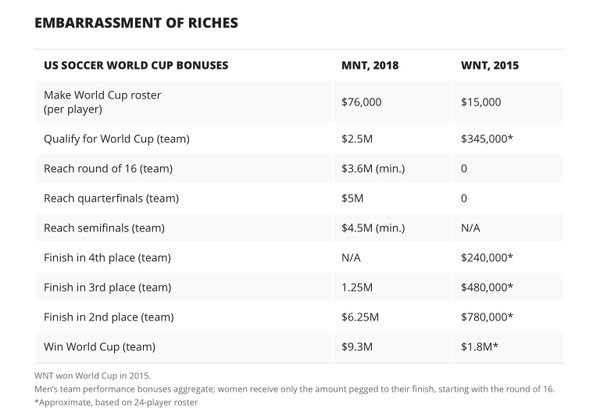Every day we see examples of people, usually women, and minorities, that aren’t paid fairly, as compared to their counterparts doing the same work. Here is a recent example dealing with the U.S. Women’s Soccer team:
Five key members of the U.S. women’s soccer team have filed a federal complaint against the U.S. Soccer Federation to the Equal Employment Opportunity Commission, alleging wage discrimination. In the complaint, the players cite USSF figures from last year showing that they were paid nearly four times less than men’s players despite generating much more revenue…
The pay disparities exist even though the U.S. women have been successful not only on the field, but also at the ticket booth and in terms of television ratings. The team’s 5-2 win over Japan in last year’s World Cup final was the second-most-watched soccer match in U.S. television history, with 25.4 million viewers. That’s also the largest television audience for a game involving a U.S. national team; the biggest audience for a U.S. men’s game was 18.2 million for a USA-Portugal World Cup match in 2014….
 Revenues for 4-year cycle: $60.2 million for US men, $51.2 million for US women…Former U.S. men’s star Landon Donovan, meanwhile, says pay should be commensurate with revenue.”
Revenues for 4-year cycle: $60.2 million for US men, $51.2 million for US women…Former U.S. men’s star Landon Donovan, meanwhile, says pay should be commensurate with revenue.”
So, what should it be? Should the women get paid the same, or more, than the men?
The women have had a much better performance. The men have brought in more money to U.S. Soccer.
Should they be paid exactly the same?
This is why compensation, on both an organizational and individual level, is so tough! Many people want to believe in pay for performance, but it’s not that easy.
If we truly compensated people based on what revenue, and profit, they drove to the organization, pay disparity would be worse than it already is.
What would I do in this circumstance?
Clearly, you need to bring the women’s compensation up closer to the men. I would not make it equal because the finances of it don’t work out. The men, at this point, make more revenue. So, I would develop a compensation model based on revenue. Since they are technically a nonprofit, you can’t base it on profit.
Because the revenues are close, the women would get a huge pay increase, but still be slightly below the men, right now. If revenues change, the comp models adjusts with the revenue change. I would also incorporate performance incentives based on reaching certain levels. This might actually push the women’s total comp above that of the men’s comp.
This puts a ton of risk on the players side. They think they want this, but what happens when revenue sucks some year, and now everyone takes a huge pay cut? Then either side would lose their minds and still want to get paid. I want to have my cake and eat it too. Welcome to the world of compensation!
Welcome to the world of compensation!
So, what would you do for the U.S. Women’s soccer team?
